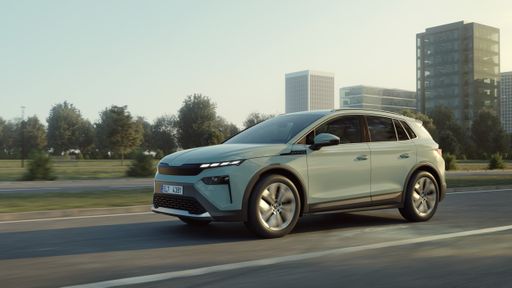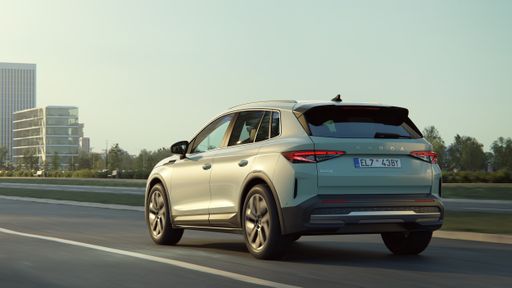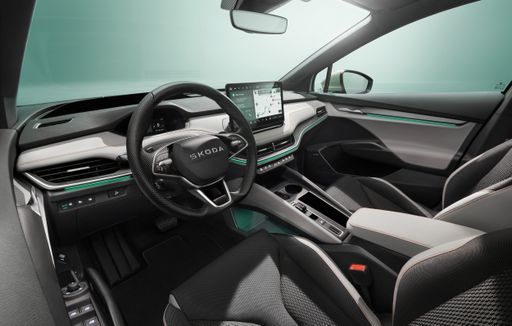Peugeot 208 vs Skoda Elroq - Differences and prices compared
Compare performance (156 HP vs 340 HP), boot space and price (20700 £ vs 29100 £) at a glance. Find out which car is the better choice for you – Peugeot 208 or Skoda Elroq?
Costs and Efficiency:
Price and efficiency are often the first things buyers look at. Here it becomes clear which model has the long-term edge – whether at the pump, the plug, or in purchase price.
Peugeot 208 has a clearly advantage in terms of price – it starts at 20700 £, while the Skoda Elroq costs 29100 £. That’s a price difference of around 8375 £.
In terms of energy consumption, the advantage goes to the Peugeot 208: with 14.10 kWh per 100 km, it’s hardly perceptible more efficient than the Skoda Elroq with 15.20 kWh. That’s a difference of about 1.10 kWh.
As for range, the Skoda Elroq performs evident better – achieving up to 573 km, about 141 km more than the Peugeot 208.
Engine and Performance:
Power, torque and acceleration are the classic benchmarks for car enthusiasts – and here, some clear differences start to show.
When it comes to engine power, the Skoda Elroq has a clearly edge – offering 340 HP compared to 156 HP. That’s roughly 184 HP more horsepower.
In acceleration from 0 to 100 km/h, the Skoda Elroq is decisively quicker – completing the sprint in 5.40 s, while the Peugeot 208 takes 8.30 s. That’s about 2.90 s faster.
In terms of top speed, the Peugeot 208 performs barely noticeable better – reaching 200 km/h, while the Skoda Elroq tops out at 180 km/h. The difference is around 20 km/h.
There’s also a difference in torque: Skoda Elroq pulls decisively stronger with 679 Nm compared to 270 Nm. That’s about 409 Nm difference.
Space and Everyday Use:
Beyond pure performance, interior space and usability matter most in daily life. This is where you see which car is more practical and versatile.
Both vehicles offer seating for 5 people.
In curb weight, Peugeot 208 is clearly lighter – 1165 kg compared to 1953 kg. The difference is around 788 kg.
In terms of boot space, the Skoda Elroq offers evident more room – 470 L compared to 352 L. That’s a difference of about 118 L.
In maximum load capacity, the Skoda Elroq performs clearly perceptible better – up to 1580 L, which is about 417 L more than the Peugeot 208.
When it comes to payload, Skoda Elroq somewhat takes the win – 531 kg compared to 430 kg. That’s a difference of about 101 kg.
Who wins the race?
The Skoda Elroq proves to be leaves the rival little chance and therefore becomes our DriveDuel Champion!
Skoda Elroq is the better all-rounder in this comparison.

Skoda Elroq
Costs and Consumption
View detailed analysis
Engine and Performance
View detailed analysis
Dimensions and Body
View detailed analysis
Peugeot 208
The Peugeot 208 feels like a city-savvy fox: compact, stylish and surprisingly grown-up, with a cabin that punches above its weight and enough personality to make daily commutes a little less boring. It’s a smart pick for buyers who want chic practicality without the showroom bluster — easy to park, thrifty to run and oddly fun when the road tightens up.
details



Skoda Elroq
The Skoda Elroq is a cleverly packaged family SUV that mixes roomy practicality with sharp, modern looks, making it an easy pick for buyers who prefer common sense over flash. On the road it's composed and user-friendly, with thoughtful interior details that turn everyday driving into something pleasantly efficient — a sensible companion with a wink.
details



|

|
|
|
|
Costs and Consumption |
|
|---|---|
|
Price
20700 - 35200 £
|
Price
29100 - 45500 £
|
|
Consumption L/100km
4.5 - 5.2 L
|
Consumption L/100km
-
|
|
Consumption kWh/100km
14.1 - 15.4 kWh
|
Consumption kWh/100km
15.2 - 16.5 kWh
|
|
Electric Range
362 - 432 km
|
Electric Range
377 - 573 km
|
|
Battery Capacity
46 - 51 kWh
|
Battery Capacity
52 - 79 kWh
|
|
co2
0 - 117 g/km
|
co2
0 g/km
|
|
Fuel tank capacity
44 L
|
Fuel tank capacity
-
|
Dimensions and Body |
|
|---|---|
|
Body Type
Hatchback
|
Body Type
SUV
|
|
Seats
5
|
Seats
5
|
|
Doors
5
|
Doors
5
|
|
Curb weight
1165 - 1530 kg
|
Curb weight
1953 - 2268 kg
|
|
Trunk capacity
309 - 352 L
|
Trunk capacity
470 L
|
|
Length
4055 mm
|
Length
4488 mm
|
|
Width
1745 mm
|
Width
1884 mm
|
|
Height
1430 mm
|
Height
1608 - 1625 mm
|
|
Max trunk capacity
1118 - 1163 L
|
Max trunk capacity
1580 L
|
|
Payload
380 - 430 kg
|
Payload
470 - 531 kg
|
Engine and Performance |
|
|---|---|
|
Engine Type
Petrol, Electric, Petrol MHEV
|
Engine Type
Electric
|
|
Transmission
Manuel, Automatic
|
Transmission
Automatic
|
|
Transmission Detail
Manual Gearbox, Reduction Gearbox, Dual-Clutch Automatic
|
Transmission Detail
Reduction Gearbox
|
|
Drive Type
Front-Wheel Drive
|
Drive Type
Rear-Wheel Drive, All-Wheel Drive
|
|
Power HP
101 - 156 HP
|
Power HP
170 - 340 HP
|
|
Acceleration 0-100km/h
8.3 - 10.9 s
|
Acceleration 0-100km/h
5.4 - 9 s
|
|
Max Speed
150 - 200 km/h
|
Max Speed
160 - 180 km/h
|
|
Torque
205 - 270 Nm
|
Torque
310 - 679 Nm
|
|
Number of Cylinders
3
|
Number of Cylinders
-
|
|
Power kW
74 - 115 kW
|
Power kW
125 - 250 kW
|
|
Engine capacity
1199 cm3
|
Engine capacity
-
|
General |
|
|---|---|
|
Model Year
2023 - 2025
|
Model Year
2025
|
|
CO2 Efficiency Class
D, A, C
|
CO2 Efficiency Class
A
|
|
Brand
Peugeot
|
Brand
Skoda
|
What drive types are available for the Peugeot 208?
The Peugeot 208 is offered with Front-Wheel Drive.
The prices and data displayed are estimates based on German list prices and may vary by country. This information is not legally binding.
